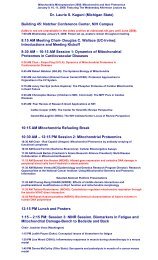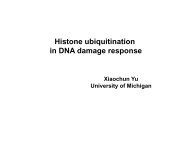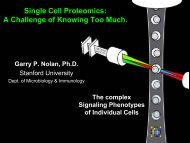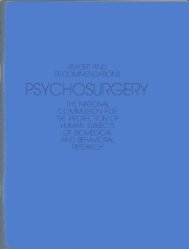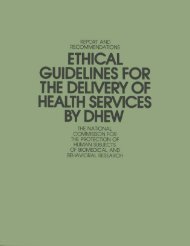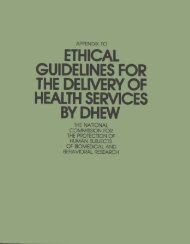RESEARCH ON THE FETUS - National Institutes of Health
RESEARCH ON THE FETUS - National Institutes of Health
RESEARCH ON THE FETUS - National Institutes of Health
You also want an ePaper? Increase the reach of your titles
YUMPU automatically turns print PDFs into web optimized ePapers that Google loves.
up to five months gestational age potential research material, provided the<br />
mother who has <strong>of</strong> course consented to the abortion, also consents to the experimentation<br />
and the father has not objected. In my judgment all infants, however<br />
premature or inevitable their death, are within the norms governing human experimentation<br />
generally. We do not subject the aged dying to unconsented experimentation,<br />
nor should we the youthful dying.<br />
Both Recommendations (5) and (6) have the additional vice <strong>of</strong> giving<br />
the researcher a vested interest in the actual effectuation <strong>of</strong> a particular<br />
abortion, and society a vested interest in permissive abortion in general.<br />
I would, therefore, turn aside any approval, even in science's name,<br />
that would by euphemism or other verbal device, subject any unconsenting human<br />
being, born or unborn, to harmful research, even that intended to be good for<br />
society. Scientific purposes might be served by nontherapeutic research on<br />
retarded children, or brain dissection <strong>of</strong> the old who have ceased to lead "meaningful"<br />
lives, but such research is not proposed--at least not yet. As George<br />
Bernard Shaw put it in The Doctor's Dilemma: "NO man is allowed to put his<br />
mother in the stove because he desires to know how long an adult woman will survive<br />
the temperature <strong>of</strong> 500 degrees Fahrenheit, no matter how important or interesting<br />
that particular addition to the store <strong>of</strong> human knowledge may be." Is it<br />
the mere youth <strong>of</strong> the fetus that is thought to foreclose the full protection <strong>of</strong><br />
established human experimentation norms? Such reasoning would imply that a child<br />
is less deserving <strong>of</strong> protection than an adult. But reason, our tradition, and<br />
the U.N. Declaration <strong>of</strong> Human Rights all speak to the contrary, emphasizing the<br />
need <strong>of</strong> special protection for the young.<br />
Even if I were to approach my task as a Commissioner from a utilitarian<br />
viewpoint only, I would have to say that on the record here I am not convinced<br />
that an adequate showing has been made <strong>of</strong> the necessity for nontherapeutic fetal<br />
experimentation in the Scientific or social interest. The Commission's reliance<br />
is on the Battelle Report and its reliance is misplaced. The relevant Congressional<br />
mandate was to conduct an investigation and study <strong>of</strong> the alternative means<br />
for achieving the purposes <strong>of</strong> fetal research (P.L. 93-348, July 12, 1974,<br />
Sec. 202(b): <strong>National</strong> Research Act).<br />
80



